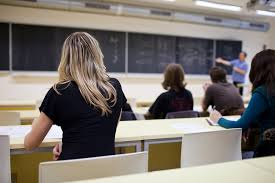
As schools, colleges, and universities begin the new academic year, it’s a good time to consider the arts and their connection to education. Last year one apparently well-intentioned administrator decided that the arts needed to take a backseat. This occurred when Interim Principal of the Harley Avenue Elementary School in Elmwood, which is located on Long Island, cancelled the annual kindergarten variety show. Why was it shutdown?
This was done because an accumulation of snow days resulted in lost instructional time. Some at the school felt that the kindergarten students had more important things to do than to perform in a show. What was that? They had to prep for college exams.
The explanation for the action arrived in a letter from Interim Principal Ellen Best-Laimit and four kindergarten teachers. The missive read, in part, “The reason for eliminating the kindergarten show is simple. We are responsible for preparing children for college and career with valuable lifelong skills and know that we can best do that by having them become strong readers, writers, co-workers, and problem solvers.”
Perhaps Interim Principal Ellen Best-Laimit has never been tested by being on stage, or by having to develop an artistic skill, or by having to interpret dialogue or a piece of music? All of these endeavors do teach participants to be “strong readers, writers, co-workers, and problem solvers.”
Still, there are various educators who feel as if the arts are an add-on to the educational process. However, if pressed on the question “what sort of world would we have without the arts?” most would have to reply, if being honest, a rather empty and dull one.
What Do Some Business People Think?
What do some of the most important business leaders and innovative creators think about the arts? Here are just a few quotes.
“In my own philanthropy and business endeavors, I have seen the critical role that the arts play in stimulating creativity and in developing vital communities….the arts have a crucial impact on our economy and are an important catalyst for learning, discovery, and achievement in our country.”
–Paul G. Allen, Co-Founder, Microsoft
“We need people who think with the creative side of their brains—people who have played in a band, who have painted…it enhances symbiotic thinking capabilities, not always thinking in the same paradigm, learning how to kick-start a new idea, or how to get a job done better, less expensively.”
–Annette Byrd, GlaxoSmithKline
“It is in Apple’s DNA that technology alone is not enough—it’s technology married with liberal arts, married with the humanities, that yields us the results that make our heart sing.”
–Steve Jobs, in introducing the iPad 2 in 2011
“A broad education in the arts helps give children a better understanding of their world…We need students who are culturally literate as well as math and science literate.”
–Paul Ostergard, Vice President, Citicorp
“Arts education aids students in skills needed in the workplace: flexibility, the ability to solve problems and communicate, the ability to learn new skills, to be creative and innovative, and to strive for excellence.”
– Joseph M. Calahan, Director of Cooperate Communications, Xerox Corporation

“GE hires a lot of engineers. We want young people who can do more than add up a string of numbers and write a coherent sentence. They must be able to solve problems, communicate ideas and be sensitive to the world around them. Participation in the arts is one of the best ways to develop these abilities.”
– Clifford V. Smith, President of the General Electric Foundation
“The rapidly evolving global economy demands a dynamic and creative workforce. The arts and its related businesses are responsible for billions of dollars in cultural exports for this country. It is imperative that we continue to support the arts and arts education both on the national and local levels. The strength of every democracy is measured by its commitment to the arts.”
–Charles Segars, CEO of Ovation
Impact of Arts
In Champions of Change: The Impact of the Arts on Learning, the only study of its kind conducted in the US, it was found that the arts had a major effect on a wide range of children, including those who are considered to be at risk. The study, which was undertaken by the Arts Education Partnership and the President’s Committee on the Arts and the Humanities and funded by the GE Fund and the John D. and Catherine T. Macarthur Foundation, found that “involvement with the arts provides unparalleled opportunities for learning, enabling young people to reach for and attain higher levels of achievement.”
Valuing the Total Effect

The arts are just one element of a commitment to total education. That commitment includes academics, health and physical fitness, and social and cultural skills, as well as artistic endeavors. It is not preparing students to take tests and score high on them so that schools look good. Somehow we have been sidetracked as to what education is about. This may be a result of No Child Left Behind as well as the emphasis on the Common Core. But no one will care one bit about what any child got on a standardized exam when they grow up and have to perform in the workplace.
Rather than high grades on exams, they will want people who can think logically, creatively, and rationally while dedicating themselves to mastery in their field as they work towards innovative solutions, new ways of envisioning the future, and concrete methods dedicated to improving our lives. The arts can help cultivate that in everyone at any age.



